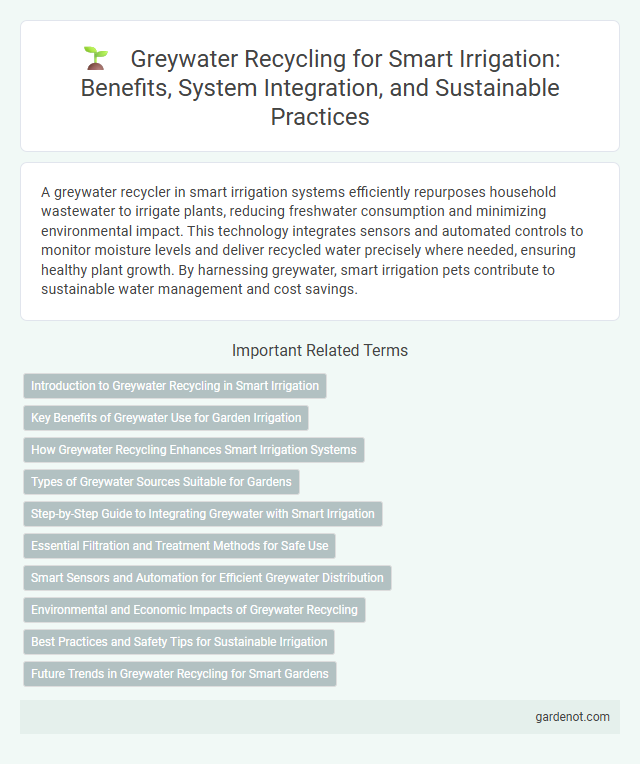A greywater recycler in smart irrigation systems efficiently repurposes household wastewater to irrigate plants, reducing freshwater consumption and minimizing environmental impact. This technology integrates sensors and automated controls to monitor moisture levels and deliver recycled water precisely where needed, ensuring healthy plant growth. By harnessing greywater, smart irrigation pets contribute to sustainable water management and cost savings.
Introduction to Greywater Recycling in Smart Irrigation
Greywater recycling in smart irrigation systems captures and treats water from sinks, showers, and laundry for reuse in landscape watering, significantly reducing freshwater consumption. Advanced filtration and disinfection technologies ensure safe reuse of greywater, enhancing water efficiency and supporting sustainable agriculture and landscaping. Integrating greywater recyclers with IoT sensors and automated irrigation controls optimizes water distribution based on soil moisture and weather conditions.
Key Benefits of Greywater Use for Garden Irrigation
Greywater recycling in smart irrigation systems significantly reduces freshwater consumption by reusing household wastewater for garden irrigation. This process lowers water bills, conserves potable water resources, and promotes sustainable landscaping practices. Using greywater also helps maintain soil moisture levels consistently, enhancing plant health and growth while decreasing the environmental impact of wastewater discharge.
How Greywater Recycling Enhances Smart Irrigation Systems
Greywater recycling enhances smart irrigation systems by providing a sustainable water source that reduces dependence on freshwater supplies. Integrating greywater treatment technologies allows precise control over water quality and distribution, optimizing irrigation efficiency and conserving resources. This approach improves soil moisture management, promotes healthy plant growth, and supports environmentally friendly landscape maintenance.
Types of Greywater Sources Suitable for Gardens
Greywater sources suitable for garden irrigation include laundry water, bathroom sinks, and shower drains, as they typically contain low levels of contaminants and nutrients beneficial for plant growth. Kitchen greywater is generally unsuitable due to high grease and food residue, which can harm soil health and clog irrigation systems. Efficient greywater recycling systems prioritize safe, nutrient-rich sources to optimize water use and support sustainable smart irrigation practices.
Step-by-Step Guide to Integrating Greywater with Smart Irrigation
Integrating greywater with smart irrigation systems involves installing a greywater recycling unit to collect and filter household wastewater, primarily from sinks, showers, and laundry, for non-potable outdoor usage. Connect the filtered greywater output to the irrigation controller, ensuring that sensors and moisture meters communicate to optimize watering schedules based on soil moisture levels and plant needs. Regular maintenance includes monitoring system filters, checking for leaks, and adjusting smart irrigation settings seasonally to maximize water efficiency and plant health.
Essential Filtration and Treatment Methods for Safe Use
Greywater recyclers utilize essential filtration and treatment methods such as sediment filtration, biological treatment, and disinfection to ensure safe irrigation water quality. Advanced systems incorporate membrane filtration or ultraviolet (UV) sterilization to effectively remove contaminants and pathogens. Proper treatment maintains nutrient levels beneficial for plants while preventing soil and water contamination in smart irrigation applications.
Smart Sensors and Automation for Efficient Greywater Distribution
Smart sensors integrated into greywater recyclers enable precise monitoring of water quality and flow, optimizing distribution for irrigation systems. Automation controls adjust irrigation schedules and volumes based on soil moisture levels and plant needs, reducing water waste and enhancing efficiency. These technologies ensure sustainable reuse of greywater, promoting eco-friendly landscaping and agricultural practices.
Environmental and Economic Impacts of Greywater Recycling
Greywater recycling significantly reduces freshwater consumption by repurposing lightly used water from baths, sinks, and laundry for irrigation, cutting water bills and conserving local aquifers. This practice lowers wastewater discharge, decreasing pollution and the burden on sewage treatment facilities, which in turn reduces environmental degradation and greenhouse gas emissions. Economically, greywater systems involve initial installation costs but deliver long-term savings through reduced municipal water dependency and potential incentives for sustainable water management.
Best Practices and Safety Tips for Sustainable Irrigation
Greywater recyclers enable efficient water reuse by treating household wastewater for safe irrigation, reducing freshwater consumption significantly. Best practices include regularly monitoring water quality, avoiding the use of harmful chemicals in greywater sources, and ensuring proper system maintenance to prevent clogging and contamination. Adhering to local regulations and installing filters and disinfection units are essential safety measures to protect plants and soil health while maximizing sustainable irrigation benefits.
Future Trends in Greywater Recycling for Smart Gardens
Future trends in greywater recycling for smart gardens emphasize advanced filtration technologies that enhance water quality and safety for irrigation. Integration with IoT sensors enables real-time monitoring and automated adjustments based on soil moisture and plant needs, optimizing water use efficiency. Emerging AI-driven systems predict usage patterns and environmental conditions, promoting sustainable water management for urban agriculture and residential landscapes.
Greywater recycler Infographic

 gardenot.com
gardenot.com